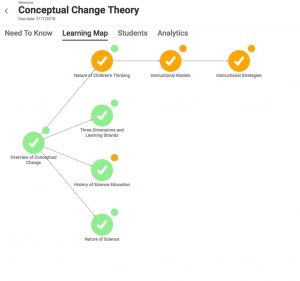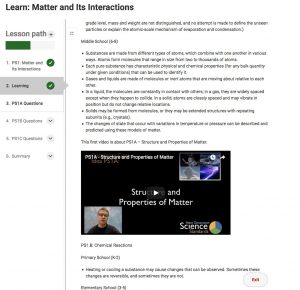This week, I want to explore Adaptive Learning and examine a pilot project running at  UW Whitewater. Over the summer of 2018, Matt Vick piloted adaptive learning in his own course using the platform “Realizeit.” He is now working with other instructors to use the platform in their courses. Matt is currently the Interim Associate Dean of the UW-Whitewater School of Graduate Studies and Continuing Education.
UW Whitewater. Over the summer of 2018, Matt Vick piloted adaptive learning in his own course using the platform “Realizeit.” He is now working with other instructors to use the platform in their courses. Matt is currently the Interim Associate Dean of the UW-Whitewater School of Graduate Studies and Continuing Education.
What is Adaptive Learning?
Adaptive Learning is an education method that creates a personalized, individual experience for a learner.
“Adaptive learning is one technique for providing personalized learning, which aims to provide efficient, effective, and customized learning paths to engage each student. Adaptive learning systems use a data-driven approach to adjust the path and pace of learning, enabling the delivery of personalized learning at scale.” – ELI 7 Things You Should Know About Adaptive Learning
Adaptive platforms likes Realizeit provide real-time feedback and data to assess student knowledge and progress toward mastery. Learners get customized content specifically tailored to their learning. If they can demonstrate that they already know a concept, they do not need to repeat it. It “adapts” to account for prior knowledge. Not every student is going to see every piece of content; they see just what they need to learn and do not already know.
Instructors get insights into their students’ progress through the class. An instructor would spend less time working on the content delivery or knowledge transfer but instead focus their interactions on higher-level applied thinking.

Learning Progress as viewed by students
That is similar to what Matt experienced in his “Teaching Science in Elementary and Middle School” course this summer. After creating the map of the nodes, Matt created text and provided video links for learning objects in various nodes the corresponded to knowledge areas students needed to know. The Realizeit system determines knowledge for these areas – students that already knew the content would not need to work through those areas. They were able to review questions and information in places they may not be that strong. An example of a learning map is shown.
What are some the challenges to adaptive learning?
One of the challenges was building the banks of questions to differentiate levels of learning and determine what students knew. This was a large amount of work. Matt created additional content and assessment questions. The team hired a student worker to review the questions for formatting and display and to help troubleshoot and test the system. Students can repeat nodes to work towards mastery. Writing these questions requires more content. New models are needed to differentiate learning…if there are multiple paths you need multiple layers of assessment to determine knowledge.
It is important to note that adaptive learning does not replace reading, or homework, or other more traditional activities in the classroom. Each node requires content! While Realize it determines an individual student’s knowledge of a particular topic, the platforms delivers lesson plans and content. Not every student will know the same things about a topic. For the structure of Matt’s “Teaching Science in Elementary and Middle School” course, there were additional activities outside of the adaptive platform. An example of a Lesson Path follows.

Screenshot of a lesson node from RealizeIt
What were some of the lessons learned?
While Matt spent a greater amount of time to set up the course, once it was in place, he was able to provide more attention to specific student needs in the class. He reported that he spent about 10% of his time teaching the course doing lower level remediation which was down from about 30% of a normal section.
Matt reported a few things that he learned this summer during the summer project:
- It took a LOT of time to set up, map, and configure and configure the course. An adaptive platform requires that content be restructured and rebuilt. Because each student will know different things from a knowledge set more content is needed.
- Students adapted to the system much more easily than anticipated. It was intuitive and easy to use from the student’s point of view.
- The determine knowledge algorithms worked! This provided a great way to validate prior learning and provide individual learning experiences.
Adaptive learning could benefit others by rethinking course content into smaller chunks. Low stakes, granular assessments help adult learners or accelerated learners move through a course at different paces. These adaptive learning structures help validate non-credit learning processes and honor the time and information students already know. A system like Realizeit could benefit courses that contain a large body of knowledge…especially for content that instructors think students should really know.
Adaptive learning has a lot of potential. Creating personalized learning paths in an automated and individual way could benefit students. Adaptive platforms could deliver large bodies of knowledge more efficiently than traditional methods.
– Ted Witt
Teaching, Learning, and Technology Consultant
RESOURCES:
7 Things You Should Know About Adaptive Learning
RealizeIt




